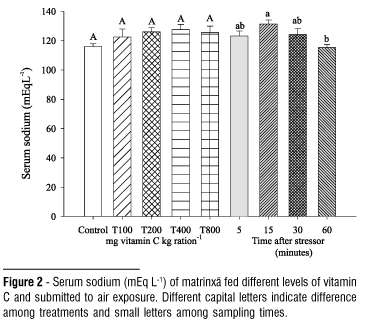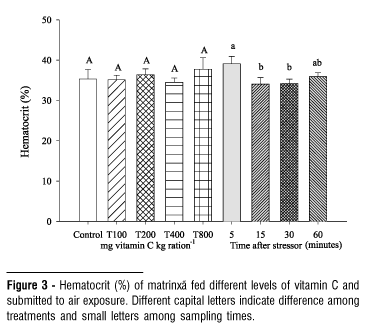The role of vitamin C on physiological responses of matrinxã (Brycon amazonicus) submitted to air exposure was analyzed. Nine hundred fish (70.15 g) were distributed in fifteen 500 l boxes (60 fish.box-1) and fed five rations (treatments): Control (no vitamin C); T100 (100 mg); T200 (200 mg); T400 (400 mg) and T800 (800 mg of vitamin C kg.ration-1). Each ration was offered to fish of three boxes during 60 days before the stress challenge that consisted of exposing fish to air for two minutes. Samplings were carried out for 5, 15, 30 and 60 minutes after the air exposure. Blood was collected for glucose, cortisol, total protein, sodium, chloride, hematocrit, hemoglobin determination, and white and red cell count. Liver was removed for hepatosomatic index (HSI) calculation and glycogen determination. Vitamin C did not affect the levels of cortisol, chloride, total protein, hemoglobin, leukocytes, hepatic glycogen or HSI in air exposed fish. Blood glucose levels elevation observed 60 minutes after the challenge did not depend on the levels of vitamin C, nor did the drop in serum sodium levels verified 60 minutes after stressor. In general, hematocrit did not change by effect of vitamin C but it was lower at 15 and 30 minutes after the challenge. The number of erythrocytes decreased in fish after 5 minute sampling in all treatments, especially at 30 and 60 minutes. The air exposure evoked alterations in stress indicators of matrinxã, and the vitamin C did not alter the responses.
Brycon amazonicus; capture; stress; ascorbyl - polyphosphate





